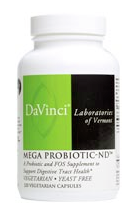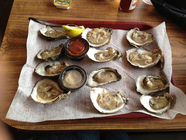Probiotics

HOW DOES YOUR MICROFLORA GROW?
Probiotics are live microorganisms that make up our gut flora. These “friendly” bacteria help keep bad bacteria and yeast from developing in your intestinal tract that can make you sick.
Probiotic supplements are a simple, effective way to boost healthy bacteria, creating an environment that may help reduce symptoms of irritable bowel syndrome, lactose intolerance, urinary tract infections, chronic sinus infections, and ulcerative colitis. You’ve probably heard that eating yogurt with “live and active cultures” is helpful, but you can also make your gastrointestinal flora flourish with these other enzyme-rich options:
• Natto - a type of fermented soybeans that has been enjoyed by the Japanese for a long time that is rich in vitamin K.
• Kimchi – a well-known Korean pickle dish most commonly made with cabbage. Other variations of kimchi are made with cucumbers, eggplants, leeks, radishes and other in season vegetables. High in vitamin A, C, B1, B2, beta-carotene, calcium, and iron.
• Sauerkraut - The Western counterpart of kimchi, this tangy-tasting pickled cabbage dish is high in vitamin C and digestive enzymes.
• Miso - Most commonly, fermented soybean, barley, or brown rice combined and a type of fungus known as koji. High in vitamin B12, zinc, copper, and manganese.
• Tempeh - Another probiotic food derived from fermented soybeans, tempeh has a nutty taste that is reminiscent of meat, and makes a yummy meatless burger.
• Kefir - A popular fermented milk drink in many European countries, including Finland, Hungary, Norway, Poland, Romania, Russia, Sweden and Ukraine, it has been found to exhibit anti-tumor and anti-inflammatory properties.
References: Theconsciouslife.com and Probiotics.org
Probiotics are live microorganisms that make up our gut flora. These “friendly” bacteria help keep bad bacteria and yeast from developing in your intestinal tract that can make you sick.
Probiotic supplements are a simple, effective way to boost healthy bacteria, creating an environment that may help reduce symptoms of irritable bowel syndrome, lactose intolerance, urinary tract infections, chronic sinus infections, and ulcerative colitis. You’ve probably heard that eating yogurt with “live and active cultures” is helpful, but you can also make your gastrointestinal flora flourish with these other enzyme-rich options:
• Natto - a type of fermented soybeans that has been enjoyed by the Japanese for a long time that is rich in vitamin K.
• Kimchi – a well-known Korean pickle dish most commonly made with cabbage. Other variations of kimchi are made with cucumbers, eggplants, leeks, radishes and other in season vegetables. High in vitamin A, C, B1, B2, beta-carotene, calcium, and iron.
• Sauerkraut - The Western counterpart of kimchi, this tangy-tasting pickled cabbage dish is high in vitamin C and digestive enzymes.
• Miso - Most commonly, fermented soybean, barley, or brown rice combined and a type of fungus known as koji. High in vitamin B12, zinc, copper, and manganese.
• Tempeh - Another probiotic food derived from fermented soybeans, tempeh has a nutty taste that is reminiscent of meat, and makes a yummy meatless burger.
• Kefir - A popular fermented milk drink in many European countries, including Finland, Hungary, Norway, Poland, Romania, Russia, Sweden and Ukraine, it has been found to exhibit anti-tumor and anti-inflammatory properties.
References: Theconsciouslife.com and Probiotics.org
ZINC AND MALE SEXUAL HEALTH

Zinc, a trace mineral, is necessary for maintaining a healthy immune system, and most commonly known for fighting soar throats. It is particularly important for men to get enough zinc in their diet, as it is required for normal prostate function. Potential fathers should consider that zinc levels are depleted on ejaculation; so replenishing your mineral supply may help increase sperm mobility. Zinc may also play an important role in fighting infection and inflammation of the prostate in older men.
It is possible to quickly reach toxic levels of certain trace minerals like zinc, especially if you are taking mega-dose supplements, so some general recommendations should be followed. Do not exceed the levels set by the Institute of Medicine (IOM), which suggests 15 milligrams per day for males over 11 years old. Click here for more specific intake facts.
Ultimately, however, you should strive to get all of your nutrients first and foremost from healthy food sources, including:
▪ Fish and shellfish (especially oysters)
▪ Hormone-free dairy products
▪ Peanuts and peanut butter, legumes
▪ Organic beef, pork, lamb, and dark meat of chicken (in moderation)
Resources:
http://www.lifeclinic.com/focus/nutrition/zinc.asp
http://www.ageless.co.za/zinc.htm#General%20information%20on%20zinc
http://www.livestrong.com/article/293328-zinc-and-male-fertility
It is possible to quickly reach toxic levels of certain trace minerals like zinc, especially if you are taking mega-dose supplements, so some general recommendations should be followed. Do not exceed the levels set by the Institute of Medicine (IOM), which suggests 15 milligrams per day for males over 11 years old. Click here for more specific intake facts.
Ultimately, however, you should strive to get all of your nutrients first and foremost from healthy food sources, including:
▪ Fish and shellfish (especially oysters)
▪ Hormone-free dairy products
▪ Peanuts and peanut butter, legumes
▪ Organic beef, pork, lamb, and dark meat of chicken (in moderation)
Resources:
http://www.lifeclinic.com/focus/nutrition/zinc.asp
http://www.ageless.co.za/zinc.htm#General%20information%20on%20zinc
http://www.livestrong.com/article/293328-zinc-and-male-fertility
